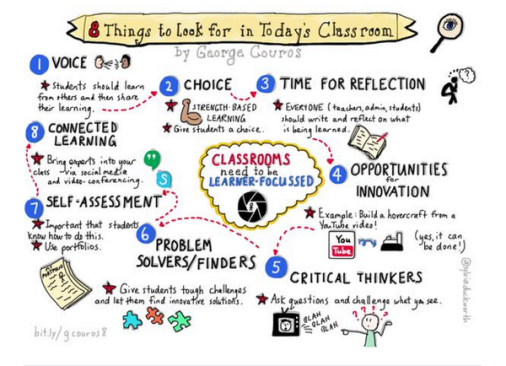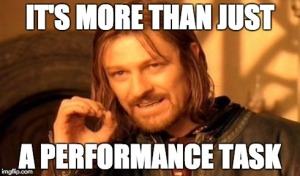This past week, two of our district’s high schools administered a District-created Performance Task. The task consisted of a classroom activity one day, and the following day, a self-guided time of research, curating/synthesizing information, and writing a position paper on a topic that was relevant to our local community. After finishing the task, students were given the opportunity to give feedback about the Performance Task. Later in the week, teachers at one high school had the chance to give feedback about their experience and that of their students at a staff meeting. I was pleasantly surprised by some things that come out in the discussion.
A couple of teachers caught my attention by sharing that after the Performance Task was over, they observed some students talking to each other about positions they took in their papers, using evidence from the research they had been given and read. It was an “Aha” moment for me because what those students were doing is what we should be looking to see OFTEN across the curriculum. They weren’t just “unloading” the facts that had been covered in lectures, readings, and videos or showing they could defend a proposition in an essay assignment. They had “uncovered” meaningful information and made real-world connections about a topic that was relevant to them and their community. They were, in fact, engaged in authentic dialogue with THEIR voice.
With the digital tools available to us today, there are many ways we can provide students fertile ground for dialogue and the integration of various perspectives. Students can learn in an abundance of perspective, of information, and of connection with others. Their learning process and thinking are changed as they are given room to explore, problem-solve, and synthesize and share their perspective. And whether or not that was intended, something spontaneously occurred.
“Not a series of remembered ideas, reproduced for testing, and quickly forgotten. But something flexible that is already integrated with the other things a learner knows.” (Dave Cormier, 2011)
At one point, the discussion took another unexpected turn. It was pointed out that students need to begin learning what they will face in today/tomorrow’s job market. And part of that is being able to adapt and learn in uncertainty. The question was raised, “Is all we want from experiences like this is for students to demonstrate learning through a graphic organizer and essay, or are there other long-term objectives we should be targeting in the process? And are we scaffolding this learning along the way to prepare them for real world performance tasks, where they have to demonstrate the ability to research, curate, reflect on, and create/share/demonstrate learning?”
Christina Hendricks (@clhendricksbca), a member of my PLN (professional learning network) wrote, “…the “best learning” has to do with helping people deal with uncertainty, to figure out how to make decisions and choose the paths they should take when faced with situations in which the outcomes are uncertain. Education is tricky because we don’t know exactly what sorts of knowledge will be needed in the future, the changes different fields will undergo, the changes new technologies will bring, etc. So encouraging good decision-making and creative problem-solving skills, as well as the ability to continually guide one’s own learning to gain new knowledge as needed, are critical. (ETMOOC: Rhizomatic Learning in Philosophy Courses, 2013)

8 Things to Look for in Today’s Classroom – a Sketchnotes created by @sylviaduckworth http://georgecouros.ca/blog/archives/5027
We need to be serious about helping students learn relevant life skills – Habits of Mind (as well as subject matter and other applied skill sets). Our district is grappling with how to connect our curriculum to Career Technical Education pathways and STEM education. This curriculum moves beyond preparing students for college to the job market and daily life. As one teacher stated, “Employers aren’t asking if you can write a good essay.”
Although the Performance Task was originally designed to assess students’ skill at being able to demonstrate a variety of academic skills, it became obvious that we need to think more broadly when creating District/State Assessments. I’m looking forward to seeing how our thinking and practice across the district reflects continuing transformation in our pedagogy and practice.




Although this first District Wide Performance Task came fast as far as what we teachers were to do to prepare students, overall it was a great idea. It also has room for improvement but I do not know exactly what we were looking for? Hopefully Science Dept.s or teachers are on the Performance Committee for the content in Science and English folks for writing skills? I like the idea of having multiple measures, especially having more local control of formative assessments.
I’m actually looking forward to having dialogue with my students to learn about their experience w/Dist. Wide Performance Task. Yolanda
Yolanda, it was a bold step for the District to create it’s own formative assessment with the pressure of the SBAC Online Assessment coming. Even with the areas that need to be improved, I think the learning process has been valuable. I agree with you that having multiple measures, especially with formative assessments that we have control over. It’s something that I hoped we would see at some point in time. Look forward to hearing what your students have to say about their experience.
Glenn, unfortunately I will not be able to share their experiences right away, soon. I see the last of my IS students this Friday but I’ll keep you posted. Yolanda